As one tall, handsome and congenial golfer was winning Australia’s very first Masters last April, another tall, handsome and congenial golfer from Queensland was keenly looking on.
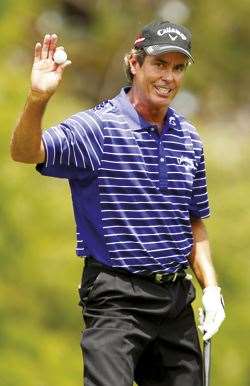 photos by Getty Images
photos by Getty ImagesAs one tall, handsome and congenial golfer was winning Australia’s very first Masters last April, another tall, handsome and congenial golfer from Queensland was keenly looking on, revelling in the accomplishment.
From his days as a player, three times a top-ten finisher in the Masters in the early 1990s, to becoming the voice of Amen Corner for the CBS network, Ian Baker-Finch’s associations with Augusta run deep. While he’s proven himself to be among golf’s best television commentators, the victory of Adam Scott drove the man they call Finchy to near speechlessness.
Inside Sport caught up with IBF, still on a high a week after Scott’s breakthrough, to chat about this year’s Masters. We also asked the Open champion of 1991, who famously suffered through a precipitous decline in form after winning his first Major, what it means to a player to win one of golf’s great titles, and whether they are harder to win now than back in his prime. Baker-Finch’s heyday was Australian golf’s most successful collectively, as it saw four men claim Major titles in the space of six years – after the Aussies’ showing at Augusta this year, does a new golden era beckon?
Did you have a good feeling that Australia’s Masters hoodoo was coming to an end? We’ve been disappointed so often before ...
Yeah, for sure. Because we had three in the battle, the odds seemed to be in our favour and it was going to be our time. So I just kept trying to think positive all afternoon, no matter what happened. It could’ve been Jason Day, it could’ve been Marc Leishman. But in the end it was Adam Scott who stood up, who made the putts and hit the shots when he had to, especially the big putt at 18.
But the golfing gods, it appeared they were frowning on Australia once again when Angel Cabrera made the birdie at 18 to tie with Adam, after that wonderful celebration of his. It was hard to stay up, stay positive at that time. It was like, “Aw, my God, is this going to happen again? How could that be?” I tried to channel through some good, positive vibes for Adam. It was amazing golf, wasn’t it?
You know Cabrera a bit from Presidents Cups. When he hit that shot in – that’s what he does, right? He seemed like the perfect guy to foil Australia’s chances.
Cabrera has no fear. He is a free-flowing, feel player, emotional player. Grew up in the slums of Argentina, and nothing seems to bother him. He’s a wonderful guy, by the way, everyone loves him. No one was rooting against Angel, it’s just that we were all rooting for Adam.
I shouldn’t say “rooting” in Australian sport, should I? I’m too American now (laughs). “Barracking” for Adam.
It was like the perfect scenario for him to be against Adam. The funny thing is, they’re team-mates at the Presidents Cup as well. Everyone in those Presidents Cup teams over the years loved Angel, wanted to be his partner.
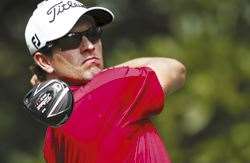 photos by Getty Images
photos by Getty ImagesYou could see it in how they both hit their second shots into the second play-off hole. Angel turned around to say, “Great shot, Scotty,” and Adam acknowledged. They’re in the heat of battle trying to win a Major, and they’re congratulating each other.
Angel won in a play-off there, an unlikely one, in ’09. He sort of came from nowhere and won the jacket. When he bogeyed 13, I thought it was going to be hard for him to win. But he hit a phenomenal shot at 18.
In the case of Scotty, we attach so much mystique to winning the first Major. What does Adam learn about himself now that he’s knocked down the door?
I can tell you that when you win your first Major, and I only won one, there’s so many emotions that go through your mind. There’s one of relief, in a way, when you’ve had chances before and haven’t won. There’s that feeling of, “I’ve finally won a Major.”
For Adam, it’s, “I’ve finally won the Masters.” What adds to that emotion is winning one that means so much to Australia, with the whole country watching.
Adam Scott thoroughly deserves to be the first Australian to win it, deserves the moment, the position in history. He’s a wonderful player and a tremendous young bloke.
More than a few astute golf observers pointed out a similarity between Scott’s win at 32 years old and Phil Mickelson in 2004. Do you think that’s valid, that this win will lead to a few more Majors for Scott, just as it did for Mickelson?
I couldn’t agree more. He’s got all the pieces of the puzzle in place to keep on doing great things. As you said, Mickelson didn’t win until a similar age, has won three more – one PGA, three Masters. Ben Hogan won nine, and didn’t win his first until 34.
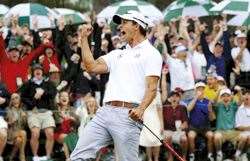 photos by Getty Images
photos by Getty ImagesBut apart from all the numbers, Scott has what it takes to continue on and win more. If you look at his record in the Majors the last two years, he was really knocking on the door. Not only should he have won the Open last year, that may have just been a great learning experience. He saw how easily it can slip from your grasp no matter how well you’re playing. He was like, “Oh no, I hope I win a Major after throwing that one away.” But the level of golf that he played, he knew he had what it takes to win a Major. At the time, it was hard, but if he turned it into a positive, if he could figure out the emotional side of it ... he did it. Good that he did it so quickly. It’s happened so many times, that someone loses a Major, then within the next 12 months, they win, even after the huge emotional loss. When Wayne Grady, Greg Norman and Mark Calcavecchia were in a play-off for the Open in 1989, Wayne won the PGA in ’90.
Adam, as well as he’s playing, might win another Major this year.
It can be liberating – once that first one is out of the way, golfers can treat Majors like another tournament, rather than a career-defining moment ...
Yeah, Angel was playing to win a Major. He didn’t have the same ... “pressure” is not even enough of a word when you’re heading towards winning a Major. He’d had his two; big difference to Adam looking for one.
But you have to be careful. I thought when I won, I reset my goals to win them all. I thought, “If I can win that one, there’s no reason why, if I just keep doing this and improving that, and if I can hit it a bit further ... ”
You have to be careful you don’t get ahead of yourself. But I think Adam’s beyond that. He’s already at that level where Majors are just part of his career.
You talked a lot about the emotion of the day, what it meant to Australian golf. And people in the golf world were becoming aware of it. What was your sense of the reaction at Augusta? And how significant was it to you, being part of the Australian delegation to the Masters, as it were, for so long?
It’s significant; it was something that had been missing for so long. You can go on and on about our sporting achievement, but it was so well-known that an Australian had never won the Masters. I’ve been doing television since I stopped playing at the Masters – my last year was 1996. It’s well-noted here in our telecasts with CBS, and our telecast is for the US. Other people watch it, but it’s for the US.
The magnitude of the win is well-known around the world. I tell you, I was in tears. I know Greg Norman was in tears, because I talked to him. When Scotty made the putt at 18, (CBS commentator) Jim Nantz threw it straight to me, saying, “Ian, this has got to be an emotional time.” I really struggled to say anything, to be honest with you. I kept it very short and tried to be appropriate.
When he won, it had all been noted throughout the commentary. As soon as he holed that putt, Jim threw it to me again, because he wanted to get that emotion. Again, I was really choked up. When I talk about my Open win, I get a bit choked up about it. And when you ask me that question (about the Masters) just a week on, I’m still the same way.
The way he did it – there was no luck involved. It was great play. And he holed that putt – Steve Williams, who used to be my caddie in the ’80s, was right on the ball. But you’ve still got to hit the putt, you know? I wish I was a better wordsmith to put it in perspective.
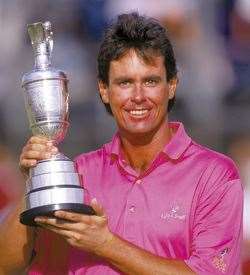 photos by Getty Images
photos by Getty ImagesThe tower at Amen Corner, the 11th and 12th, that’s become your spot. You could get few better than that, but is there any other place on the course you’d like to work?
I think I have the best seat in the house – 11 and 12 is a phenomenal place. I’m honoured to be part of the telecast at CBS; we’ve got so many guys who have been doing it for a quarter-century or more. The one thing is – apart from when an Australian is in play – I’m out of the mix as they go to 13. I’m done, hand it over to Peter Kostis. I’ll jump in if I think of something pertinent, or Jim Nantz might bring me in. But that’s the only thing for every one of us who works there – we all wish we could be at 18, because you’re involved in the drama all the way through to the end. But the only other holes I’d want are 11 and 12.
After this showing at the 2013 Masters, there’s a lot of positive momentum for the Aussies on tour. But there was this kind of feeling in 2006 when Geoff Ogilvy won the US Open, and a bunch of other Aussies won on the PGA Tour. We were anticipating a period like the early ‘90s, when yourself, Grady, Norman and Elkington won Majors – but it didn’t happen. What are your thoughts about Aussie golf going forward?
Over the years, there has been a progression of good Australian players since the Greg Norman era. Greg’s six years older than me, couple of years older than Wayne Grady, and I’m a couple of years older than Elkington, then a couple of years older than Parry. Then along came Appleby and Allenby – Stuart especially, a few chances in Majors, just couldn’t get it across the line.
Ogilvy, at least he won a Major; he kept the flow going in the 2000s. But there’s been a big lag since then in Australians having a chance to win a Major, until we all got energised with Adam last year. I think Adam’s the guy; Leishman a couple of years younger, Day a couple of years younger again – maybe we’ve got a little group now that will continue to perform well in Majors and create the excitement back home ...
If they can do that, and come back and play at the end of the year at the Australian tournaments, it would be huge for the game. We’re never going to have the amount of tournaments that we used to have, because the amount of money that they play for every week over here is $6m minimum. We just can’t afford that prize money in Australia ... But if we have five $1m tournaments, and one or two really big $3m ones, that would be an achievable goal. But can we get back to the days of 20 tournaments on television? I don’t think that can happen anymore with the way world golf is. But as long as those core players continue to perform well and win a Major here or there, golf will remain a little more in the media. Maybe we’ll get an extra page in the paper instead of 17 pages of football.
Where do you stand on the idea of depth versus quality on tour right now?
There’s an argument that there are more good players coming from around the world, but the money and the equipment has promoted mediocrity. Do you think it’s harder to win Majors now, or was the peak higher in the old days, when it was multi-Major winners always battling each other?
I think the depth in world golf is far stronger than it’s ever been, I really do. They all play together so much more now; the top 50 players in the world are all members of the US Tour, even though 30 of them aren’t American. In the old days, that didn’t happen. It was only at the Majors that the top players got together, plus the occasional other event.
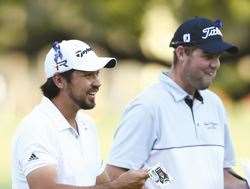 photos by Getty Images
photos by Getty ImagesAll the best players are playing against each other week-in, week-out. They’re bigger, fitter, stronger, faster, better prepared. They all have a team around them, almost like a race team ... And there’s so much money in the game. I don’t know the exact figure, but I wouldn’t be surprised if 250 golfers in the world are making $1m a year. And 100 golfers are making $2m, and the top ten $10m. And that allows for a lot of stuff to go on on the periphery of that: better coaching, more resources.
But does that imply that Majors are harder to win? Is a three-time Major winner now the equivalent of a five-time winner 20 years ago?
I know where you’re headed – it’s hard to equate. But yeah, it’s harder to win multiple Majors now, because there are more players capable. If you look at the last 15 years, Tiger’s won 14 of them, so anyone in that era since ’97 who won more than one is doing well ... If you want to go back in history, if you look at the Majors through the ’60s, ’70s and ’80s, it was almost the same top ten every time. You knew eight of the top ten every week before they started. You knew it was going to be Nicklaus, Watson, Player, Palmer earlier, later Seve.
You pretty much knew the great players were going to perform every time. But you look at the Majors now, sometimes you don’t even know more than two in the top ten, right? Anyone can win one. Who would’ve thought Marc Leishman would be a chance coming into the Masters?
Mandatory Tiger question: he’s back to playing well consistently, but in the last couple of years he’s had good starts at Majors and bad weekends. Is this a thing?
I think he is regaining his confidence, gradually building layer upon layer of confidence. Just the same as it gets stripped away, it’s coming back. Last year, he was happy with his swing, Thursday-Friday get himself into contention, Saturday-Sunday couldn’t quite finish it off – almost like a young guy coming through for the first time, feeling his way. This year at the Masters, who knows? If the ruling and the eight on 15 on Friday hadn’t happened, would he have been close enough to intimidate the others? You never know what might have happened.
I think he’s on the way back, and I think he breaks Jack’s record. I think he has another career in him and that he’ll win multiple Majors going forward. And hopefully he’s contending with Adam Scott in every one of them, and Adam wins a few as well.
US Open: do you know Merion, and how do you see things shaping up?
Merion is one of the top ten courses in the world, certainly in everybody’s top 20. It’s where David Graham fired that great final-round 67 to win the US Open in ’81. Extremely difficult course, and normally it’s all about the greens: hard, fast and tough. It’s not a long course, but they’ve gone in and lengthened it 400 yards, made it more difficult. The rough will be horrendous; it’ll be extremely narrow.
The USGA are all about even par winning their tournament; they have this thing about even par. And it demands so much patience – it’s why, at times, you get unlikely winners, because it just wears you down ...
I think keeping it in the fairway somehow is key, and the big hitters have an advantage there because they can hit 3-iron 250 yards, so it’s more about keeping it in play. And the greens are always so difficult, it’s not always the best putter that wins on extremely fast greens, it’s the most patient, best-lag putter. You’ll have to do that around Merion.
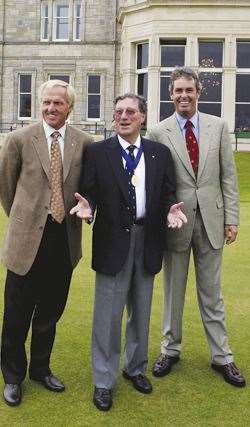 photos by Getty Images
photos by Getty ImagesHow is your game these days? You dabble in the over-50s events, and you play a lot, if your Twitter account is anything to go by ...
It’s good, I play well, contrary to what many think (laughs). I think golfers know that I play and love the game. My handicap’s a plus-three at the club. It means I’m averaging a 69 when I play. I’m playing a tournament this week, the Legends, been in the top ten the last two years ...
I can still play okay. I just don’t play well enough to go compete on a regular basis, but that’s mainly because I do 30 weeks a year of television. And you can’t compete against guys who are doing it day in, day out, who are playing golf for a living.
But I love the game. I love to play, every day I have a day off. I’m a golf nut. The biggest part of my life is my family, my travels and playing all the great courses.
Did you ever entertain thoughts of going back to the grind, or is TV too important to you?
No, I’ve been doing TV for 15 years. There are times when I play and I think, “I’d really like to go do this again.” But the ability to have such a great job, and be comfortable in what I do, come back to Australia at the end of each year – now that my kids are finished school, I can come back and do some work for television – I’m in a good place. There’d be a lot of people lining up if I put my job in the employment section of the paper.
Final question: I’m fascinated by Medallist, your home club in Florida, which has become the new hot spot for the tour players. Is there a story you can share from behind the walls?
It’s always been a player’s club – Pete Dye and Greg Norman designed the course. A difficult test of golf, but a great environment in the club. It’s very similar to a Kingston Heath-style clubhouse: low-key, great locker room, always some kind of sport going on in the men’s grill. And the membership, especially over the last couple of years when clubs have been doing poorly, everyone’s started to see there was a great core group of members. I go up to play all the time and we play “Wolf” games and great betting games. Excellent practice facility, and a lot of pros started to join because it was such a good test, because the greens were so good, because there was always a game there.
And now, in the last couple of years, it’s become the club in the area. I’ll go up to hit balls, and Tiger will come over: “Hey buddy, let’s go play a few when you’re finished.” There’d be ten pros there every day. Preparing for a Major the week before, 20 or 30. Rickie Fowler’s there, Olin Browne and his son, who plays on the mini-tours. Mark Calcavecchia, Jeff Sluman, Dustin Johnson, James Driscoll, all
the Swedes. Good bunch of amateur players, too, that I play a lot with – one, two or three handicaps. And my group, we’ll play in fives or sevens, even nines. And we’ll always play in under four hours.
– Jeff Centenera
Related Articles
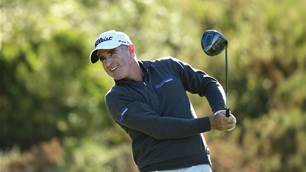
Video interview: Drinks With ... Matt Millar
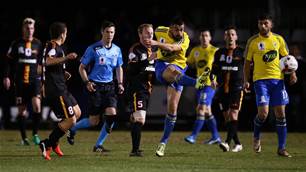
Berries' FFA Cup hero: I'm still numb
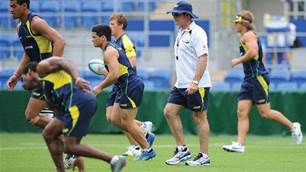
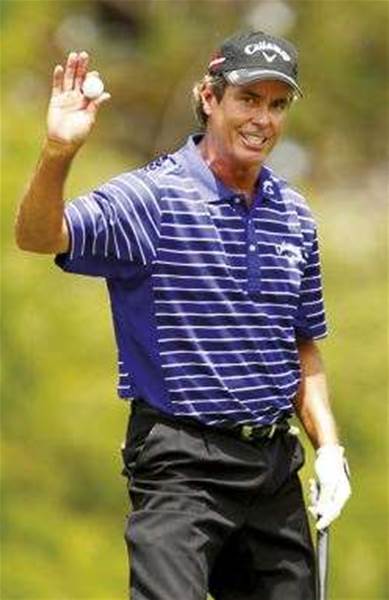

.png&h=115&w=225&c=1&s=1)









